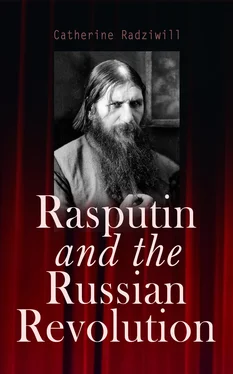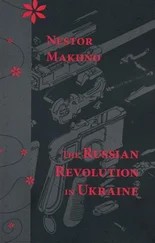There was also another incident in which Rasputin most certainly was implicated. This was the dismissal of Mr. Kokovtsoff, then Prime Minister and President of the Council, followed by the appointment in his place of old and tottering Mr. Goremykine, to whom no one in the whole of Russia had ever given a thought as a possible candidate for this difficult post. Count Witte was the personal enemy of Mr. Kokovtsoff, whom he had never forgiven for his so-called treason in regard to himself, and he never missed any opportunity to attack him in the Council of State, of which they were both members, criticising his financial administration and making fun of the splendid budgets which were regularly presented to the Duma. These Witte declared to be entirely artificial, reposing on a clever manipulation of figures. In some ways it was easy to find fault with Mr. Kokovtsoff, whose name had been mixed up far too much for the good of his personal reputation in all kind of financial transactions and Stock Exchange operations. But, then, the same thing had been said about Count Witte with perhaps even more reason than about Mr. Kokovtsoff, whose wife, at least, had never been suspected of any manipulations with her banking account. Indeed, no finance minister in Russia had escaped accusations of the kind from his detractors or his adversaries, and it had never interfered with their administrative careers nor prevented them from sleeping soundly.
So far, so well; but then this was more the work of events as they had unfolded themselves naturally than the merit of Rasputin; yet he was openly congratulated by his friends, or so-called ones, on the success which he had obtained in driving Mr. Kokovtsoff away. The ultra-orthodox party which hailed the advent to power of one of its members—Mr. Goremykine having always been considered as one of the pillars of the conservative faction—not only cheered the “Prophet” with enthusiasm but also started to proclaim anew his genius and clear understanding of the needs of the Russian people. Thus a ministerial crisis culminated in the apotheosis of a man whose only appreciation of the qualities and of the duties of a Minister consisted in the knowledge of that Minister’s existence as a public functionary.
Table of Contents
Among Rasputin’s adversaries was Mr. Stolypine, who, with strong common sense and great intelligence, had objected to the importance which certain social circles in St. Petersburg had tried to give to the soothsayer. At first he had regarded the whole matter as a kind of wild craze which was bound to subside in time, as other crazes of the same sort had dwindled into insignificance in the past. Later on, however, some reports that had reached him concerning the persons who frequented Rasputin’s society had given him reason to think that there might be something more than stupid, enthusiasm in the various tales which had come to his ears in regard to the Prophet of Pokrovskoie. He, therefore, expressed the wish to see him, so as to be able to form a personal judgment of the man, and a meeting was arranged in due course at the house of one of the ladies who patronised Rasputin. It is related that after he had cast his eyes upon him Mr. Stolypine, when asked to give his opinion on the personality of the individual about whom he had heard so many conflicting reports, had simply replied:
“The best thing to do with him is to send him to light the furnace; he is fit for nothing else.”
The words were repeated and circulated freely in St. Petersburg; they reached Rasputin, and enraged him the more, because, shortly afterwards, it was Mr. Stolypine who had insisted on having him expelled from the capital, and who for two whole years had refused to allow him to enter it again. When, therefore, in the early autumn of 1912 the “prophet” at last was allowed to return to St. Petersburg, it was with the feelings of the deepest enmity against the Minister who had exiled him. He had the satisfaction of finding that during his enforced absence the popularity of Mr. Stolypine had decreased, and that a considerable number were openly talking about overthrowing him. Rasputin very soon discovered the use which could be made of this state of things, which surpassed by far any hopes he might have nursed of being able to be revenged upon the President of the Cabinet for the injury which he imagined that the latter had done to him. He proceeded in all his sermons to compare him with the Antichrist, and to say that Russia would never be quiet so long as he remained one of its rulers.
The police agent, whose name I have already mentioned, Mr. Manassevitsch Maniuloff, who always had his eye on Rasputin, and who had hastened to call upon him as soon as he had seen him return to the capital, was not slow to notice the now outspoken animosity of the latter in regard to the Prime Minister, who was offensive to him as well as to the whole secret police. The latter, finding that it could no longer do what it pleased, and that it had to respect the private liberty and life of the peaceful Russian citizens, or else be called to account by Mr. Stolypine, who ever since his appointment had been working against the occult powers of the “Okhrana,” had but one idea; and this was to get rid by fair means or by foul of a master determined to control the police. It is known in Russia that Mr. Stolypine’s assassination was the work of the secret police itself, who had found the murderer in the person of one of its own agents, to whom it had furnished even the revolver with which to kill the unfortunate Stolypine. But few people dared relate all that they suspected in regard to this heinous crime, and fewer still were aware of all its details, and of the manner in which it had been planned.
The truth of the story is that Mr. Maniuloff secretly took to Rasputin’s house two or three police agents, to whom the latter said that God himself had revealed to him that Russia could never be saved from the perils of revolution until the removal of Mr. Stolypine. He even blessed the officers, together with a pistol with which he presented them. It turned out afterwards that this pistol was the very weapon which the Jew Bagroff fired at the Prime Minister in the theatre of Kieff during the gala performance given there in honour of the Emperor’s visit to the town. When Stolypine had succumbed to his wounds, Rasputin made no secret of the satisfaction which his death had occasioned to him, and exerted himself in favour of several people who were supposed to have been privy to the plot that had been hatched against the life of the Prime Minister. He told his disciples that the fate which had overtaken the unhappy Stolypine did not surprise him at all, and that every one of those who would venture to oppose him would meet with a similar one in the future.
In a certain sense, this threat had an effect on those before whom it was uttered. People began to dread Rasputin, not on account of any supernatural powers he might have been endowed with, but because they saw that he had managed to get into association with individuals utterly unscrupulous and ready to resort to every means, even to assassination, in order to come to their own ends. They thought it better and wiser, therefore, to get out of his way and not to attempt to thwart him. He became associated in the mind of Russian society with conspirators similar to the Italian carbonari or Camorrists. The conviction that, under the veil of religious fervour, he was able to persuade his satellites to do whatever he pleased, and to hesitate at nothing in the way of infamy and crime, gradually established itself everywhere until it was thought advisable to have nothing to do with him, or else to submit to him absolutely and in everything. It was very well known that he had had a hand in the murder of Mr. Stolypine, but not one single person could be found daring enough to say so, and an atmosphere of impunity enveloped him together with those who worshipped at his shrine or who had put themselves under his protection.
Читать дальше












